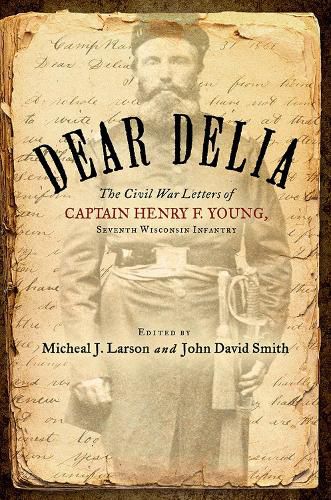Readings Newsletter
Become a Readings Member to make your shopping experience even easier.
Sign in or sign up for free!
You’re not far away from qualifying for FREE standard shipping within Australia
You’ve qualified for FREE standard shipping within Australia
The cart is loading…






Dear Delia chronicles the story of Henry F. Young, an officer in the famed Iron Brigade, as told through 155 letters home. His insights, often poignant and powerful, enable readers to witness the Civil War as he did. Young covers innumerable details of military service-from the camaraderie, pettiness, and thievery he witnessed among the troops, to the brutality of internecine war. He was an equally astute observer of the military leadership, maneuvers and tactics, rumored troop movements, and what he considered the strengths and weaknesses of African American soldiers. From newspapers, he retained a firm grasp of Wisconsin and national politics, often noting incidents of graft and corruption and offering pointed opinions regarding the 1864 presidential election. Above all, Young’s communications highlight his unflagging patriotism-his fierce determination to preserve the Union no matter the cost. Candid, contemplative, thorough, and occasionally humorous, Young provides a clear window into everyday events as well as into war, society, and politics. Civil War enthusiasts will appreciate this correspondence, as it reveals the perspective of a young officer from America’s western heartland, a regional viewpoint generally omitted from Civil War-era documentary projects.
$9.00 standard shipping within Australia
FREE standard shipping within Australia for orders over $100.00
Express & International shipping calculated at checkout
Dear Delia chronicles the story of Henry F. Young, an officer in the famed Iron Brigade, as told through 155 letters home. His insights, often poignant and powerful, enable readers to witness the Civil War as he did. Young covers innumerable details of military service-from the camaraderie, pettiness, and thievery he witnessed among the troops, to the brutality of internecine war. He was an equally astute observer of the military leadership, maneuvers and tactics, rumored troop movements, and what he considered the strengths and weaknesses of African American soldiers. From newspapers, he retained a firm grasp of Wisconsin and national politics, often noting incidents of graft and corruption and offering pointed opinions regarding the 1864 presidential election. Above all, Young’s communications highlight his unflagging patriotism-his fierce determination to preserve the Union no matter the cost. Candid, contemplative, thorough, and occasionally humorous, Young provides a clear window into everyday events as well as into war, society, and politics. Civil War enthusiasts will appreciate this correspondence, as it reveals the perspective of a young officer from America’s western heartland, a regional viewpoint generally omitted from Civil War-era documentary projects.